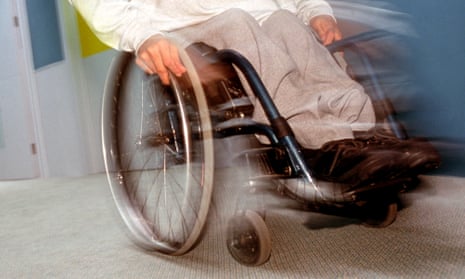Halfway into a decade of austerity, the biggest threat posed by the Conservatives’ cuts may not be the suffering they are causing mentally ill, sick or disabled people but something altogether more lasting: that their suffering is becoming normalised.
I can think of no other reason why the work capability assessment – the now notorious test used by the Department for Work and Pensions to determine who is eligible for out-of-work sickness benefits and who should be classed as “fit for work” – remains in place.
This is a benefit assessment that has been proven to make people’s conditions worse, and that time after time has been linked to the suicides of people who were declared “fit for work” and had their sickness benefits removed.
It has now been more than 18 months since the mainstream media – including this paper – reported the death of Mark Wood. Despite struggling with multiple mental health problems, the 44-year-old was found “fit for work” in 2013 (Wood’s doctor described him as “extremely unwell and absolutely unfit for any work whatsoever”). Four months later, he was found dead in his home weighing 5st 8lb.
Any social security system requires a process that can accurately – and humanely – determine who needs out-of-work sickness benefits (and who is physically and mentally fit to be on jobseeker’s allowance, looking for work). This can’t be a test based on suspicion but one that values the opinion of the disabled person and their own doctor, rather than a stranger hired by an outsourced private company. Instead of a crude box-ticking judgment of impairment, any assessment needs to appreciate how someone’s health actually affects their ability to get and keep a job.
What exactly is the DWP waiting for? Today, a consultant with the Royal College of Psychiatrists tells the Guardian that tougher “fit for work” tests are causing relapses in patients with serious mental health conditions. This comes only a week after public health researchers at the University of Liverpool linked the work capability assessment to 590 suicides, as well as 279,000 cases of self-reported mental health problems and 725,000 antidepressant prescriptions.
It is difficult to call this as anything but a national scandal. The scandal is not only that this has been allowed to build over a number of years, but that a government department ever initiated a rapid, widespread testing process – by definition, on some of the most marginalised members of society – without what appears any consideration of its impact.
As the Liverpool study’s main author, Benjamin Barr, puts it: “This benefit assessment programme, which you are introducing to a very large number of people, should have the same level of rigour applied [as that of cancer screening in the NHS] to see whether we want it or not. You have to be sure you are not causing harm.”
Pause a moment to consider the fact the ministers in charge of providing support for people with schizophrenia, multiple sclerosis and cancer need to be told that they should check the process is not “causing harm”. It is telling that the DWP is, instead, focusing on criticising research for not using figures that they say can “link claimants’ deaths to welfare reforms”, while refusing to release the data that would help make that possible.
This is where blind, austere ideology has driven us: a point where the distress, physical pain and even death of disabled and mentally ill citizens are not seen as travesties to avoid but, rather, as little more than collateral damage.
The “fit for work” scandal did not develop by accident. It is born from the central message of austerity: that to rely on social security is legitimate cause for being treated by government any way it likes. It is worth remembering that Mark Wood was expected to survive on £40 a week when he died; not only is this system finding severely ill people “fit for work”, but it is leaving them with benefits that are barely more than a pittance.
We know that one million sick, mentally ill and disabled people were put through the work capability assessment between 2010 and 2013. As I write, more will be sitting in assessment centres up and down the country, about to be tested; others will be sitting at home, staring at the doormat, waiting for “the brown envelope” that can pull their support from under them.
In a climate of so-called “welfare dependency”, the crime is not simply having a disability or illness but not having enough money to survive without the state’s help. Forget security, the “fit for work” test is more like a form of punishment.

